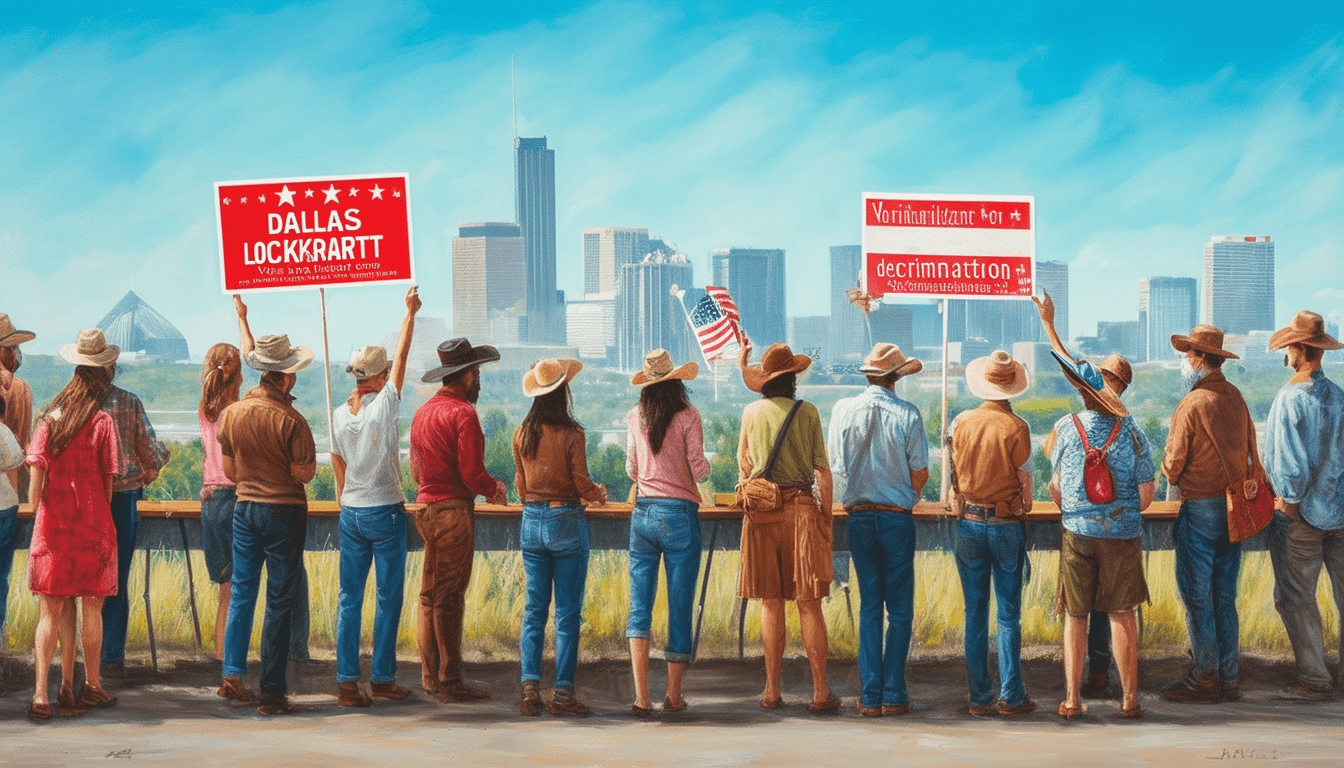Texas Voters in Dallas, Lockhart, and Bastrop Embrace Local Marijuana Decriminalization Measures at the Polls
|
IN BRIEF
|
In a significant shift towards cannabis reform, voters in Dallas, Lockhart, and Bastrop have recently embraced local marijuana decriminalization measures during the polls. This decision reflects a growing sentiment among Texans advocating for a more progressive approach to cannabis legislation. By approving these initiatives, these cities join a movement that prioritizes justice, reduces discrimination in law enforcement, and allocates resources to address more pressing public safety concerns, marking a critical moment in the ongoing debate over marijuana policy in the state.

In a significant wave of change, voters in three Texas cities—Dallas, Lockhart, and Bastrop—have cast their ballots in favor of local marijuana decriminalization measures. This movement demonstrates a growing trend among residents to reevaluate their stance on cannabis reform and align local policies with their preferences. These victories showcase the power of grassroots activism and suggest a shifting landscape regarding cannabis laws in the Lone Star State.
Dallas: A Landmark Decision
The approval in Dallas marks a pivotal moment in the city’s approach to cannabis. Local lawmakers acted on the wish of the community, placing the marijuana decriminalization initiative on the ballot after activists successfully gathered the necessary petitions. The newly passed measure will decriminalize the possession of up to four ounces of marijuana, allowing individuals to possess cannabis without fear of arrest or citation for minor offenses.
This initiative reflects the sentiments shared by a considerable segment of the population, including a public push led by notable figures such as the music icon Willie Nelson, who urged voters to support the cause. The implications of this passage are profound; the Dallas police will no longer consider the smell of marijuana as probable cause for searches, ensuring greater protection against discriminatory enforcement.
Lockhart: A Community-Focused Approach
In Lockhart, local legislators faced challenges while negotiating the specifics of their ballot initiative. After ongoing discussions with community activists, the city finalized the proposal and placed it on the November ballot. The Lockhart initiative prioritizes resource management and aims to reduce the risks associated with discriminatory law enforcement practices.
As part of the decriminalization effort, Lockhart’s police department will refrain from arresting individuals for misdemeanor cannabis possession unless under specific circumstances linked to serious felonies. This initiative represents a proactive community effort to enhance public safety while reducing unnecessary legal entanglements for low-level offenses.
Bastrop: Adding to the Momentum
The city of Bastrop also saw significant progress as voters endorsed decriminalization measures. This decision follows their success in gathering sufficient signatures to bring the issue before the public. Much like in Dallas and Lockhart, the Bastrop initiative guarantees that possession of marijuana will not result in arrests or citations for minor offenses.
The approval of these measures signifies a collective shift in how communities perceive cannabis and its implications on public policy. With these pivotal victories, residents are advocating for a more balanced approach to cannabis legislation that reflects the desires of the populace.
The Broader Context of Cannabis Reform in Texas
These local initiatives in Dallas, Lockhart, and Bastrop are part of a larger trend observed across various Texas cities in recent years. Several municipalities, including Austin and Denton, have successfully enacted similar decriminalization measures that signal a more progressive stance on cannabis.
Additionally, despite pushback from state officials, including Texas Attorney General Ken Paxton and Governor Greg Abbott, who have criticized local reforms as potential chaos, public opinion is increasingly favoring these changes. A recent poll indicates a broad bipartisan support for marijuana decriminalization among Texas voters, further emphasizing that the movement is gaining traction and cannot be ignored.
As these cities embrace local reform, it will be crucial to monitor how state officials respond to these developments. The enthusiasm and persistence exhibited by grassroots activists are shaping a new narrative around cannabis in Texas, as public sentiment slowly begins to challenge traditional legal frameworks that have long governed marijuana policies.
Comparative Overview of Marijuana Decriminalization Measures
| City | Key Features of Decriminalization Measure |
| Dallas | Decriminalizes possession of up to four ounces; prohibits arrests unless linked to major crimes |
| Lockhart | Focus on resource allocation; bars arrests and citations for low-level possession |
| Bastrop | Similar prohibition on arrests for low-level possession, emphasizing community impact |
| Implementation | Quarterly reports required on enforcement practices by city officials |
| Past Reforms | Several Texas cities have enacted decriminalization measures in recent years |
| Public Sentiment | Bipartisan support among Texas voters for reducing restrictions on marijuana |

The recent election marked a significant turning point in Texas as voters in Dallas, Lockhart, and Bastrop overwhelmingly supported local measures to decriminalize marijuana. This grassroots movement reflects the changing attitudes toward cannabis reform in the state and showcases the power of community engagement in shaping local policies. With these victories, Texas continues to take steps toward a more progressive approach regarding cannabis use and possession.
Dallas: A Major Step for Decriminalization
In Dallas, the passage of the cannabis decriminalization initiative is a landmark decision for the city’s future. Local lawmakers put the proposal on the ballot after a coalition of activists gathered the necessary signatures. The new law will allow possession of up to four ounces of marijuana without the fear of arrest. This change aligns with a broader push to reduce the burden of cannabis-related charges on communities.
Local figures, such as the beloved music icon Willie Nelson, rallied support for the initiative, encouraging residents to vote for a more just and equitable future. The successful Proposition R signifies a collective desire for change among Dallas voters, setting a precedent for cities across Texas.
Lockhart: A Compromise Enhancing Public Safety
Lockhart also witnessed a successful campaign for marijuana decriminalization, as local legislators reached an agreement with activists to place the initiative on the ballot. This version of the reform emphasizes the need for careful allocation of city resources and the reduction of discriminatory enforcement practices. The measure aims to refocus law enforcement efforts on higher priority public safety concerns.
Furthermore, the Lockhart initiative assures that unless otherwise dictated by a court ruling, police will not be permitted to make arrests or issue citations for low-level marijuana possession. This change not only alleviates police burdens but also marks a significant shift in community relations and public safety oversight.
Bastrop: Echoing the Call for Change
In Bastrop, the community echoed the sentiments of Dallas and Lockhart. With enough signatures gathered, voters were given the opportunity to decide on marijuana decriminalization. The initiative mirrors those in the other cities, aiming to prevent arrests and citations under similar guidelines.
The Bastrop proposal, like its counterparts, demonstrates a unified stance toward preventing the criminalization of low-level cannabis possession, reinforcing the city’s commitment to justice and fairness.
The Wider Impact of Local Decriminalization
The momentum for cannabis reform in Texas is palpable, with numerous cities having already enacted similar decriminalization measures. The statewide movement shows a palpable shift in public opinion towards cannabis policies, countering the historically conservative stance seen in the state legislature.
This local empowerment reflects a critical trend: a significant bipartisan majority of Texas voters increasingly support marijuana decriminalization, signaling that communities are ready to reconsider outdated policies. While state-level legislation may still lag behind, local initiatives can enact meaningful change, influencing future reforms across the Lone Star State.
As this narrative unfolds, it remains to be seen how state officials will respond to such progressive community decisions and whether legislative changes will soon follow. The fight for cannabis reform in Texas is far from over, but the recent victories in Dallas, Lockhart, and Bastrop offer hopeful prospects for the future.
Key Highlights of Local Marijuana Decriminalization Measures
- Dallas: Voters approved decriminalization for possession of up to four ounces of marijuana.
- Implementation Oversight: Dallas police will not use marijuana odor as probable cause for searches.
- Lockhart: Aim to allocate resources effectively, reducing discriminatory enforcement.
- Bastrop: Prevents police from arresting for Class A or B marijuana possession unless linked to serious crimes.
- Community Engagement: Ground Game Texas led a successful campaign to encourage voter turnout.
- Reform Progression: These efforts are part of a growing trend of decriminalization across Texas cities.
- Public Support: A majority of Texas voters favor reducing marijuana restrictions, reflecting changing attitudes.
In a significant step towards cannabis reform, voters in three Texas cities—Dallas, Lockhart, and Bastrop—have embraced local marijuana decriminalization measures at the polls. This decision reflects a growing public sentiment in favor of reforming cannabis policies and signals a shift in how communities view marijuana possession. The approved initiatives will prevent law enforcement from pursuing minor possession cases, allowing local governments to allocate resources more effectively.
The Dallas Initiative
The recent decision made by Dallas voters endorses an initiative that decriminalizes the possession of up to four ounces of marijuana. This measure, which was placed on the ballot following a successful petition drive by activists, has been heralded as a significant victory for social justice and community well-being. By prohibiting arrests and citations for low-level cannabis possession, the measure not only aims to reduce unnecessary interactions between the police and citizens but also advocates for a more equitable approach to public safety.
Notably, the initiative specifies that the smell of marijuana or hemp cannot be used as probable cause for searches or seizures, further protecting individual rights. Regular reporting requirements for the city manager and police chief will ensure accountability in the implementation of the decriminalization policy, reinforcing transparency in local governance.
Lockhart’s Approach to Decriminalization
In Lockhart, voters also supported a similar marijuana decriminalization initiative that emphasizes resource allocation and community safety. The language of the Lockhart measure is particularly noteworthy; it articulates the need to reduce the risk of discrimination in enforcement practices while allowing law enforcement to focus on more pressing public safety issues.
This approach represents a concerted effort to reshape law enforcement priorities in a responsible manner. By explicitly stating that the Lockhart Police Department will not arrest or cite individuals for low-level possession unless significant circumstances arise, the measure effectively shields residents from unnecessary legal repercussions. Moreover, the prohibition on conducting THC testing further simplifies enforcement and aids in reducing bureaucratic inefficiencies.
Bastrop’s Decriminalization Decision
Bastrop’s voters joined the reform movement by endorsing another local initiative aimed at decriminalizing low-level marijuana possession. This decision reflects the city’s recognition of the changing attitudes towards cannabis and its implications for community enhancement. Similar to the measures in Dallas and Lockhart, this initiative restricts law enforcement from pursuing charges related to minor possession offenses.
The unanimous movement across these Texas cities illustrates a collective shift towards understanding marijuana not as a criminal issue but as a public health and community safety concern. By alleviating the burden of minor cannabis offenses, local governments can redirect resources to address more serious community challenges, such as violent crime and drug trafficking.
Implications for Texas Cannabis Reform
The passage of these decriminalization measures in Dallas, Lockhart, and Bastrop may inspire further cannabis policy reforms across Texas. This growing momentum indicates a significant public demand for more progressive cannabis laws. As reforms continue to advance at the local level, there may be increased pressure on state legislators to reconsider outdated cannabis laws and potential statewide decriminalization initiatives.
In light of recent changes, civic engagement and community-driven activism will be critical in shaping future policies. Residents should remain vigilant and active, ensuring their voices are heard in discussions surrounding the future of marijuana legislation in Texas. By promoting informed dialogue and encouraging community participation, Texas cities can lead the way toward a more equitable and just cannabis policy framework.
FAQ: Local Marijuana Decriminalization in Texas
Q: Which cities in Texas approved local marijuana decriminalization measures?
A: Three Texas cities—Dallas, Lockhart, and Bastrop—approved local marijuana decriminalization measures during the recent elections.
Q: What specific decriminalization measures were approved in Dallas?
A: In Dallas, the measure decriminalizes the possession of up to four ounces of marijuana, preventing police from making arrests or issuing citations for Class A or B misdemeanor cannabis possession offenses, unless it’s part of a high-priority felony investigation.
Q: How did Ground Game Texas contribute to this reform?
A: Ground Game Texas spearheaded the campaign for marijuana decriminalization in Dallas, Lockhart, and Bastrop, encouraging supporters to vote for the measures.
Q: What were the concerns of the Dallas City Council regarding the decriminalization process?
A: Some Dallas City Council members initially showed interest in streamlining the process legislatively; however, their plans did not come to fruition, leaving the decision to voters.
Q: What does the Lockhart initiative aim to achieve?
A: The Lockhart initiative aims to allocate city resources more efficiently, reduce the risk of discriminatory enforcement practices, and ensure that arrests or citations for marijuana possession are limited to specific high-priority felony investigations.
Q: Will the local police departments have any restrictions under these new measures?
A: Yes, under the new measures, local police departments in both Dallas and Lockhart are limited in their ability to arrest or issue citations for marijuana possession offenses, with additional provisions regarding the consideration of the odor of marijuana.
Q: What previous efforts towards marijuana reform have occurred in Texas?
A: In recent years, several measures have already been enacted in approximately six other Texas cities, including Austin, Denton, Elgin, Harker Heights, Killeen, and San Marcos.
Q: What is the overall sentiment among Texas voters towards marijuana decriminalization?
A: A strong bipartisan majority of Texas voters support decriminalizing marijuana, showing a preference for reducing cannabis restrictions over issues such as gun control, gambling, and abortion.





Post Comment